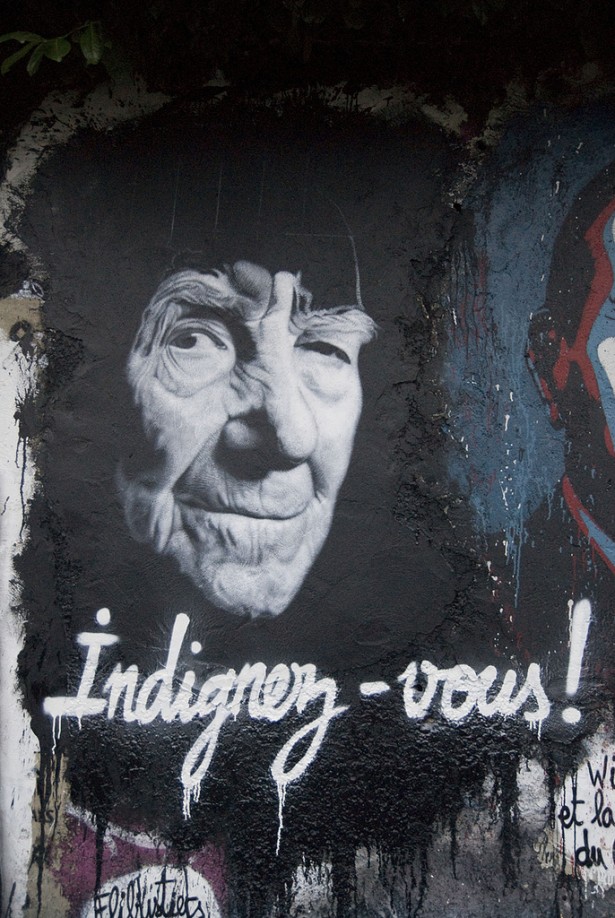
Stéphane Hessel died at age 95 on Feb. 27, 2013. A towering figure in the world of international human rights, Hessel had become in his late years a vibrant source of inspiration for the young generation by reviving the flame of civil resistance through his essay Indignez-vous! (In English, Time for Outrage!) in 2010. This pamphlet — calling on the youth to awaken from their apathy and to address the many social justice issues of our time — quickly became a best seller, spreading throughout Europe and giving its name to the movements of the Indignés in France and Indignados in Spain. A few months later, this energy would arrive in the United States and launch the global protest movement known as Occupy.
I had had the privilege to meet Stéphane Hessel in 2007 at a gathering of citizens and activists in Lyon, France, known as the Dialogues en Humanité. Since its founding in 2002 (by Hessel, among others), the Dialogues modeled a kind of interaction where everyone’s voice is valued as a contribution to discussions around issues such as human rights, social justice and environmental protection — forming a template for many citizen movements to come, including Occupy.
It was amazing to see him, such a renowned personality, taking the time to listen to everyone — particularly the young people — and to learn from each of them, welcoming any fresh idea with the enthusiasm of an adolescent. These interactions motivated him to release his pamphlet in 2010, at a time when the French government, under President Sarkozy, was launching particularly harsh immigration policies, notably against Roma people, provoking the indignation of human rights defenders in France and in Europe. Hessel was among the first to speak out on this issue. Indeed his life story is a long series of courageous actions in the name of human rights.
Hessel was all his life the incarnation of the spirit of resistance, and as expressed by French President François Hollande at his memorial service in Paris, “His capacity for indignation knew no bounds other than those of his own life. As it comes to an end, he leaves us a lesson: to refuse to accept any injustice.”
Born in Germany during World War I but educated in France from 1924 on, after his family had moved there, he was a true citizen of the world and quintessential European intellectual, believing in the brotherhood of humankind beyond borders. As a young man, he fought for his ideals through the French Résistance against Nazi occupation. Arrested by the Gestapo, tortured and sent to Buchenwald, he miraculously escaped being executed and was able to flee while being transferred to another death camp. The experiences forged during that most testing of times gave him his moral and political compass for life. But, having fought in the greatest armed struggle of all times, he then became an advocate of nonviolent struggles in the defense of human rights.
Despite all the honors and accolades he garnered throughout his brilliant diplomatic carrier at the United Nations, his capacity to get “indignant” when witnessing injustices always led him to take action. As a passionate humanist but also a pragmatic diplomat, he was able, time and time again, to creatively engage in dialogues allowing for the emergence of groundbreaking proposals to solve conflicts. For instance, he served as a mediator in the 1990s, playing a critical role in solving some of the most dramatic human rights issues such as the one facing the “sans-papiers” — the illegal immigrants who lived under the constant threat of deportation. He also tirelessly worked on the rapprochement between Israelis and Palestinians. But the tragic deterioration of events since the beginning of the century became one of his life’s great disappointments. Indignez-vous! emphasized the importance of an end to the Israeli occupation — not only for the future of Palestinians and Israelis, but for the whole world.
One of the wisest old men of our times, he was able to build bridges between his generation, who had fought the most barbaric regime of the 20th century, and today’s young generation. He inspired them to resist all the injustices of our times, especially those created by the faceless global economic and financial system responsible for the dramatic increase of inequalities throughout the world, while perpetrating the most devastating impacts on the planet.
Even though his gentle and vibrant voice has stopped talking to us, his inspiration will no doubt go on. Even he seemed to realize this in Indigez-vous!, writing, “To you who will create the twenty-first century, we say, from the bottom of our hearts, to create is to resist. To resist is to create.”

Hessel’s words certainly live on. Last weekend I was at a meeting of activists from around the United States and we each received copies of his little book in the edition recently published by Twelve. May his influence spread!